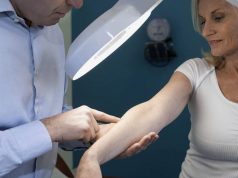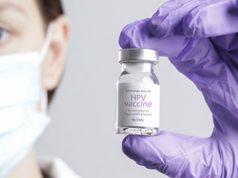Beta-HPV detected in skin swabs may predict cuSCC risk, but no link seen for serologic evidence of past beta-HPV infection
WEDNESDAY, Aug. 11, 2021 (HealthDay News) — Cutaneous beta-human papillomavirus (HPV) may predict development of cutaneous squamous cell carcinoma (cuSCC), according to a study published online July 15 in Cancer Research.
Dana E. Rollison, Ph.D., from the Moffitt Cancer Center in Tampa, Florida, and colleagues examined the development of virus-positive skin cancers following cutaneous HPV infection. Baseline cutaneous HPV infection was measured by serology and viral DNA detection in eyebrow hairs and forearm skin swabs (SSWs) from 1,008 individuals undergoing routine skin cancer screening exams.
The researchers found that baseline beta-HPV detection, especially in SSWs, predicted cuSCC (hazard ratio, 4.32; 95 percent confidence interval, 1.00 to 18.66), while there was no association for serologic evidence of past beta-HPV infection and cuSCC. Less than 5 percent of baseline beta-HPV types identified in SSW were found in subsequent cuSCC tumors; cutaneous HPV was more likely to be present in cuSCC when detected in SSW with higher versus lower mean fluorescence intensity values. In areas of highly sun-damaged skin, beta-HPV-positive cuSCC occurred more often than beta-HPV-negative cuSCC. There were no clear patterns between baseline beta-HPV detection and subsequent development of basal cell carcinoma or between baseline gamma-HPV and cuSCC or basal cell carcinoma.
“Taken together, cutaneous HPV detection could inform individual risk stratification for use in keratinocyte carcinoma prevention and screening efforts, thus minimizing the incidence, morbidity, and/or health care costs associated with this most common cancer in the United States,” the authors write.
Several authors disclosed financial ties to the biopharmaceutical industry.
Abstract/Full Text (subscription or payment may be required)
Copyright © 2021 HealthDay. All rights reserved.








